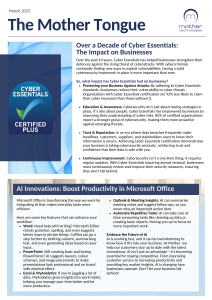Passwords are essential in today’s digital environment. Passwords protect your email, banking details, and social media accounts from unauthorised access. However, as cyberattacks become more sophisticated, it is more critical than ever to prioritise password protection. Here are some best practices to ensure that you have a strong password defence in place.
Create Complex and Unique Passwords: The days of using simply “123456” or “password” should be long gone. However, you would be surprised. According to Reader’s Digest, the most common password in 2023 was 123456. Because of people using passwords like this, more than 80% of confirmed breaches are related to stolen, weak, or reused passwords. To prevent this from happening, you should encourage employees to opt for passwords that are at least 12 characters long and include a mix of uppercase and lowercase letters, numbers, and special characters. Additionally, you should avoid using easily guessable information in your passwords, such as your name, birthdate, or common words.
Use a Password Manager: Given the large number of accounts individuals manage, it can be tempting for them to use the same password across different accounts. However, this is incredibly risky. Instead, use a password manager to create and save complicated passwords for each of your accounts. Not only does this make it easier to keep strong passwords, but it also lowers the likelihood of a single breach impacting several accounts.
Enable Two-Factor Authentication (2FA): Two-factor authentication adds an extra layer of security by requiring a second form of verification in addition to your password. This could be a code sent to your phone, your email, or through a verification app such as Duo. By enabling 2FA, even if someone manages to obtain your password, they will still need another piece of information to gain access to your account. For more information on our 2FA services.
Regularly Update Your Passwords: While it may be tempting to set and forget your passwords, it’s crucial to regularly update them to reduce the risk of a data breach. Businesses should encourage employees to change their passwords every few months, especially for accounts that contain sensitive information such as banking or customer accounts.
Beware of Phishing Attempts: Phishing is still one of the most common methods used by cybercriminals to acquire passwords and personal information. Be attentive to unusual emails, messages, or phone calls requesting your login credentials or other sensitive information. Always check the legitimacy of a request through authorised channels before supplying any information.
Educate Yourself and Others: Make sure you and your team understand how important it is to have strong passwords and the risks of using weak ones. Encourage staff to read the tips in this article to protect your business online from potential threats.
Monitor Your Accounts: Stay alert and look for any strange activity on your accounts. Create alerts for unexpected login attempts or changes to your account settings. The sooner you discover and respond to a possible security attack, the higher your chances of limiting the harm.
By following these best practices, you can significantly enhance the security of your online accounts and reduce the risk of falling victim to cyber threats. Remember, when it comes to password security, it’s better to be safe than sorry.

Read the newest edition of The Mother Tongue, packed with fresh tech insights and company updates.
